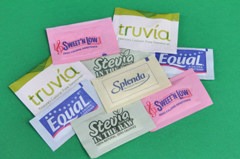 Even before we knew that artificial sweeteners like Splenda promote the growth of gut bacteria linked to obesity, I’ve always advocated for moderation in the use of noncaloric sweeteners.
Even before we knew that artificial sweeteners like Splenda promote the growth of gut bacteria linked to obesity, I’ve always advocated for moderation in the use of noncaloric sweeteners.
Even though they don’t contain sugar or calories, artificial sweeteners usually don’t promote healthy eating patterns. They tend to encourage consumption of foods without much nutritional value, such as diet sodas and sugar free desserts. Ironically, the use of artificial sweeteners can actually lead people to consume more unhealthy foods (the “Give me a diet Coke and supersize the fries” syndrome.)
Finally, it’s really hard to develop an appreciation for the subtler pleasures of fruits, vegetables, and other whole foods if your taste buds are constantly bathed in the intense hyper-sweetness of non-caloric sweeteners.
For all these reasons, I’ve always suggested that you consume artificially sweetened foods and beverages with the same restraint that you’d use with sugar-sweetened versions. But what exactly does that mean?
If the goal is to eat less than 25 grams of added sugar per day, that translates to:
- 3 packets of Splenda, Equal, Truvia, Stevia in the Raw, or Monkfruit in the Raw
- 6 teaspoons (2 tablespoons) Splenda granulated sweetener or Equal Spoonful
- 6 teaspoons (2 tablespoons) Stevia or Monkfruit in the Raw Baker’s Bag
- 6 teaspoons (2 tablespoons) Lakanto or Laktano Golden
- 6 teaspoons (2 tablespoons) Erythritol
- 3 teaspoons (1 tablespoon) of Splenda Sugar Blend or Brown Sugar Blend
- 3 teaspoons (1 tablespoon) of Truvia Baking Blend or Brown Sugar Blend
- 2 1/2 teaspoons of Truvia Spoonable
- 12 ounces of diet soda, tea, or Crystal Lite
For guidelines on other types of foods, see also: What does moderation mean, exactly?

Any idea if Monk fruit based sweeteners are closer to stevia in terms of promoting better gut bacteria (Bacteroides), or if they’re closer to the obesity promoting sugar alcohols (Streptococcus mutans)? I find Monk fruit sweeteners much more palatable than Stevia.
It’s a shame there’s no free lunch, sugar alcohols like Erythritol and to a lesser extent Xylitol, might help with dental cavities.. yet here they are making us fat.. they should pick a side, good or bad!
Here is an interesting little piece on this subject:http://www.sciencefriday.com/segments/artificial-sweeteners-might-sour-your-microbiome/
Apparently this research focused exclusively on artificial sweeteners (saccharine, aspartame and sucrose). Is there evidence or logic to support the position that “natural” artificial sweeteners such as stevia are as detrimental as their man made cousins?
Yes, I unpacked that study (along with additional research on the more “natural” noncaloric sweeteners) in this episode:http://www.quickanddirtytips.com/health-fitness/weight-loss/artificial-sweeteners-and-weight-gain-mystery-solved
Thank you. Some day I am going to figure out an organized way to read every thing you have ever written. Seriously.
I have always been mystified by the apparent connection between diet soda and obesity. When you tell those people they shouldn’t be doing it, they are quick to point at the nutrition label.
The woman in my life is one of those. She is svelte but works pretty hard at it. I make her soda from scratch using a soda stream machine, liquid organic stevia and concentrated flavorings from a snow cone products manufacturer. Current favorites are pink bubble gum and caramel mocha :). Still I worry about the 2 liters a day she typically consumes.